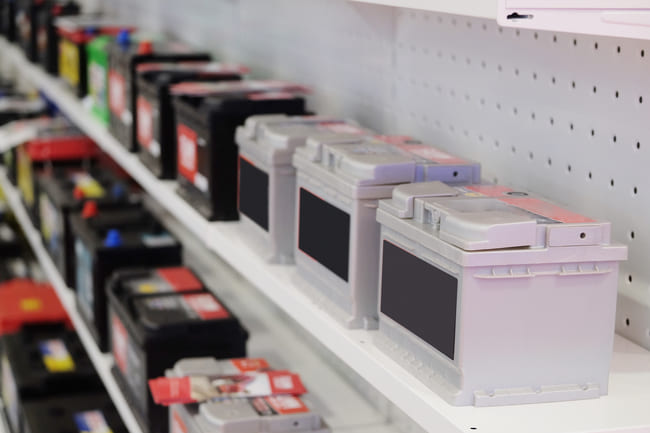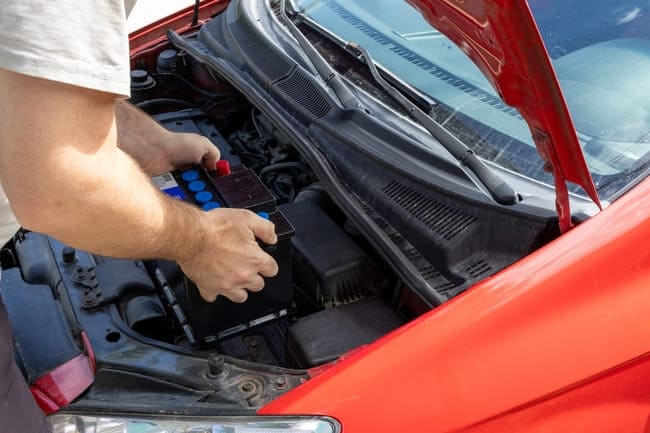Table of Contents
Car battery types: What are the different types, and which is best for your car?
AGM batteries are the best choice for most modern vehicles, offering superior performance and durability. Car batteries come in different types, each with its own benefits. Lead-acid batteries are budget-friendly and widely used. Gel batteries handle extreme temperatures well, while lithium-ion is lightweight and long-lasting but more expensive. The best option depends on your vehicle, climate and overall budget.
What are the different car battery types?
Seven main car battery types are available: conventional lead-acid, Enhanced Flooded Battery (EFB), Absorbent Glass Mat (AGM), lithium-ion, gel cell, calcium-calcium, and deep cycle batteries. When choosing a new car battery, it helps to understand these options and their specific benefits.
Sold by AUTODOC Sold by AUTODOC Sold by AUTODOC Sold by AUTODOC Sold by AUTODOC  BOSCH Battery
12V 60Ah 680A AGM Battery
BOSCH Battery
12V 60Ah 680A AGM Battery


 VARTA Battery
12V 60Ah 540A Lead-acid battery
VARTA Battery
12V 60Ah 540A Lead-acid battery
 VARTA Battery
12V 80Ah 740A Lead-acid battery
VARTA Battery
12V 80Ah 740A Lead-acid battery
Lead-acid batteries are the most common choice, offering reliable performance at a low cost for everyday driving needs. If your car has a basic start-stop system, an EFB is a step up—built to handle frequent charging cycles more effectively. AGM batteries go even further, with advanced construction that supports faster charging, greater durability and strong performance for vehicles with high electrical demands.
Lithium-ion batteries, often found in electric and premium models, deliver excellent energy density, lower weight and a longer lifespan, though they come at a higher price. Each option suits different driving styles, vehicle systems and budgets. The table below will help you compare key features and decide what's right for you.
| Battery Type | Description | Common Use | Key Advantages |
|---|---|---|---|
| Lead-Acid (Flooded) | Traditional battery with liquid electrolyte | Most petrol/diesel cars | Low cost, widely available |
| AGM (Absorbent Glass Mat) | Sealed, maintenance-free, and absorbs acid in glass mats | Start-stop systems, luxury vehicles | Longer life, spill-proof, deep cycle capabilities |
| EFB (Enhanced Flooded Battery) | Improved flooded battery for moderate start-stop use | Mid-range vehicles with start-stop | More durable than standard flooded, affordable |
| Gel Cell | Uses silica to gel the electrolyte | Off-road, deep cycle, speciality use | Vibration-resistant, spill-proof, long lifespan |
| Lithium-Ion (Li-Ion) | Lightweight, advanced chemistry with high energy density | Electric vehicles (EVs), hybrids | Fast charging, lightweight, long lifespan |
| Calcium-Calcium | Lead-calcium alloy plates reduce water loss | Modern cars in warm climates | Low self-discharge, maintenance-free |
| Deep Cycle | Designed for long, slow discharge cycles | RVs, boats, EVs | Reliable deep discharge without damage |
Lead-Acid (Flooded)
Lead-acid batteries cost the least and are widely available, making them the most traditional choice for standard vehicles. These flooded batteries have liquid electrolyte freely flowing around lead plates in a sulphuric acid solution, producing electricity through chemical reactions between the lead and acid.
These batteries are valued for their low upfront cost, easy availability and long-standing track record. They perform well in mild climates and are fully recyclable. On the downside, they need regular maintenance, including checking and topping up electrolyte levels with distilled water as the liquid evaporates. They also emit hydrogen gas during charging, so proper ventilation is essential.
Flooded batteries typically last 3 to 5 years and are best suited to older vehicles or those without modern electrical loads or start-stop systems. They're sensitive to extreme temperatures.

AGM (Absorbent Glass Mat)
AGM batteries are maintenance-free and spill-proof, making them ideal for modern vehicles with start-stop systems. These sealed lead-acid units hold the electrolyte in fibreglass mats, creating a more durable design than traditional flooded batteries.
They charge faster, handle deep discharges well and resist vibration, making them perfect for vehicles with high electrical demands. AGM batteries also have lower self-discharge rates and can be mounted in various positions without leaking.
AGM batteries typically last 4 to 7 years and are a top choice for premium cars, motorcycles, and vehicles with advanced features. While more expensive and sensitive to overcharging, their benefits often justify the higher cost.
EFB (Enhanced Flooded Battery)
EFB batteries offer better durability than standard flooded batteries at a moderate price, making them ideal for cars with basic start-stop systems. These Enhanced Flooded Battery units are upgraded versions of traditional flooded batteries, designed with improved plates and electrolyte for better cycling performance.
EFBs handle repeated charge-discharge cycles more effectively and offer better vibration resistance and deeper discharge recovery while keeping the familiar maintenance needs of flooded batteries. They sit between standard flooded and AGM batteries in terms of cost and capability.
EFB batteries typically last 4 to 6 years and are a cost-effective step up from standard options, making them a smart choice for drivers wanting more performance without the price of AGM.
Sold by AUTODOC Sold by AUTODOC Sold by AUTODOC Sold by AUTODOC Sold by AUTODOC  YUASA Battery
12V 65Ah 600A EFB Battery
YUASA Battery
12V 65Ah 600A EFB Battery
 BOSCH Battery
12V 60Ah 540A Lead-acid battery
BOSCH Battery
12V 60Ah 540A Lead-acid battery
 BOSCH Battery
12V 90Ah 720A Lead-acid battery
BOSCH Battery
12V 90Ah 720A Lead-acid battery
 BOSCH Battery
12V 80Ah 740A Lead-acid battery
BOSCH Battery
12V 80Ah 740A Lead-acid battery
 VARTA Battery
12V 74Ah 680A Lead-acid battery
VARTA Battery
12V 74Ah 680A Lead-acid battery
Gel Cell
Gel cell batteries excel in extreme temperatures and harsh conditions, making them ideal for marine use and off-road applications. These sealed lead-acid batteries turn the electrolyte into a thick gel, eliminating free-flowing acid and creating a spill-proof, maintenance-free design.
These batteries handle deep discharges well and resist common issues like stratification and sulphation, helping them last longer. They can be mounted in any position and don't release gas during use. However, they charge more slowly and are sensitive to overcharging, so they need a precise charging system.
Gel cell batteries are not common in everyday cars but are ideal for caravans and harsh climates where dependable, low-maintenance power is essential.
Lithium-Ion (Li-Ion)
Lithium-ion batteries are essential for electric and hybrid vehicles, offering the highest energy density and longest lifespan of any battery type. These advanced batteries use lithium compounds to deliver high-efficiency power, making them a major step up from traditional lead-acid systems.
Li-ion batteries are lighter, more energy-dense, and longer-lasting than any lead-acid option. They charge quickly, hold voltage consistently, and have very low self-discharge. Li-Ion units are also maintenance-free, environmentally cleaner in use, and capable of thousands of charge cycles across a wide temperature range.
However, they are much more expensive, require precise battery management systems, and can be affected by extreme temperatures, overcharging, or deep discharge. For electric, hybrid, and high-performance vehicles, their benefits often outweigh the higher cost.

Calcium-Calcium
Calcium-calcium batteries are maintenance-free with low self-discharge, making them ideal for vehicles stored for long periods. These enhanced lead-acid batteries use calcium on both battery plates instead of antimony, reducing water loss and creating better shelf life and durability.
They're well-suited for vehicles that aren't driven regularly, as they hold charge longer and resist overcharging. These batteries also offer good vibration resistance, longer service life, and minimal gassing during normal use. However, they're more sensitive to deep discharge and need a higher charging voltage to reach full capacity.
Often used as original equipment in modern cars, Calcium-Calcium batteries cost slightly more than standard lead-acid options but deliver better reliability with less upkeep.
Deep Cycle
Deep cycle batteries deliver steady power over long periods, making them ideal for RVs, boats, and renewable energy storage rather than starting car engines. Unlike standard car batteries that provide short bursts of high current, deep cycle batteries are built for sustained energy output and withstand repeated deep discharges.
They feature thicker battery plates and denser active material, allowing them to be discharged down to 50% or more of their capacity without damage. While they recharge more slowly and aren't suited for starting engines, they excel in powering electronics, lighting, and auxiliary systems.
Deep cycle batteries typically last longer in sustained-power applications than regular batteries would. They're available in various types, including AGM, Gel, and Lithium-Ion, each offering different benefits depending on the use case. Proper charging and maintenance are key to maximising their lifespan.
Which car battery type is best?
AGM batteries are the best choice for most modern vehicles with start-stop systems and high electrical demands. Traditional lead-acid batteries remain reliable for older cars with basic electrical needs, while lithium-ion batteries are essential for electric and hybrid vehicles. The right battery depends on your vehicle's specific requirements and driving conditions.
AGM batteries offer the best balance of performance, durability, and maintenance-free operation, especially for vehicles with advanced features, frequent short trips, or heavy electronic loads. EFB batteries provide a more affordable upgrade for cars with simpler start-stop systems. Traditional flooded batteries remain cost-effective for older vehicles with minimal power demands.
Calcium-Calcium batteries are ideal for vehicles stored long-term thanks to their low self-discharge rate. Ultimately, your choice should consider your car's technology, how you drive, the climate, and your budget. AGM stands out as the premium standard for today's vehicles, while conventional lead-acid types still serve everyday needs well.
A useful video on this topic:
How to choose the right battery for your car
Top products related to this topic:










